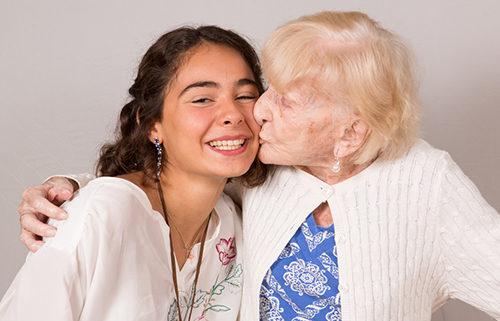The residents and staff are saying a fond farewell to an exceptional 19-year-old young woman this month. Sarah , our 2017-2018 Action Reconciliation Service for Peace (ARSP) Intern, will be returning home to Germany at the end of the month. Sarah has brought so much joy to so many residents through her boundless energy, personal engagement and genuine affection for them. Sarah sat down with Jonathan Schwartz, Selfhelp’s Director of Jewish Life, to reflect on her time with us.
JS: Sarah, you have a unique background and your Jewish journey continues to unfold. What’s your background?
Sarah: As you know, I’m German. My mother is a Jew from Russia and my father is Iranian. I didn’t know I was Jewish until last year. Because of the repressive and dangerous environment in the Former Soviet Union (FSU), my mom never spoke to me about it and we were not affiliated in any way. I discovered my Jewish identity when I applied for this program. In a conversation with one of my sponsors, a proud a Zionist, he casually mentioned that I was Jewish by virtue of my Jewish mother.” Receiving this news on the virtual eve of coming to SH was confusing and at the same time inspiring.
JS: How so?

Sarah: Well, I was rearranging my thoughts on the fly as I began my work here. Coming to SH was a beautiful opportunity to explore Judaism and Jewish life. I had really wanted to work at a historical Jewish facility and was drawn to it because of my desire to learn and befriend Holocaust survivors.
I’m very thankful that I was so warmly welcomed from the very beginning. It felt like my home almost immediately. I If I hadn’t come to SH, I never would have the opportunity to discover my Jewish identity. There were so many “firsts.” I was so happy to celebrate all the holidays with so many different families who all celebrated it differently. I can’t thank the Hirsch’s, Dyna Weiss’s family, Liza’s family and so many others for welcoming into their homes for the Jewish holidays. I especially enjoyed the Passover Seders with these SH families. I took some Hebrew lessons from Joe Katz and learned about Shabbat by being part of the beautiful Friday night dinners here.
JS: What did you learn about Jewish identity in America?
Sarah: I would ask residents if they feel Jewish if they are not religious, and they would say yes. This came as surprise to me. I had naively thought all Jews were religiously observant (based on what I saw in Germany). I understand now, that being Jewish can mean many different things to different Jews. Being here, I learned that being Jewish is an ethnic and cultural identity for many residents. I began to put my identity in perspective. I thought a great deal about how my mother had been scared to be openly Jewish in the FSU and now it is a defining element of my identity. Realizing that our residents are fully engaged Jews, regardless of observance, helped me understand and get comfortable with my (still) emerging Jewish identity.
JS: What are your thoughts after spending so much time with our Residents?
Sarah: I didn’t grow up with grandparents, so I didn’t have much experience with older people. Now, I have a much different perspective on aging and old age. I see the residents as individuals and as friends; age doesn’t matter. I saw them as friends just like friends my age.
I was so honored that so many of them opened up and spoke to me about what really mattered to them. Some are hurt that others, at times, see them as only senior citizens and don’t see them as a whole person anymore, with passions, interests, and memories. We still have active artists and art lovers who go on outing and are so happy when they are invited.
It is amazing how curious the residents are about so many things. SH is special, among so many other reasons, because it provides so many activities and new learning opportunities.
JS: Has you understanding of the Shoah changed?
Sarah: As good as Holocaust education is in Germany, I have a much deeper understanding now. The Holocaust is no longer an abstraction. It feel that it was taught to me that way in school…as if this was “history” that happened long ago. It is not a historical matter to be examined from a distance. Simply put, it is our history, our grandparents.
Hearing, breathing in the horrific stories of some residents and seeing the remarkable way that so many re-started their lives from nothing floored me. The strength, resilience and dignity of the Survivors inspire me daily.
JS: One of the things people like about you so much is your joyful energy and openness to “bite off” as much of life as you can. What were some the highlights of your adventures here in Chicago and in the US?

Sarah visits The Taste of Chicago with Julius Tan (2017 intern) and residents Helga Schrimmer and Evelyn Tosh
Sarah: This is a beautiful city, full of amazing culture and museums. I loved going to CSO concerts, visiting the Art Institute and taking in Joffrey Ballet performances with residents. I’d invited one or two residents to join me for these outings, building bonds with them and getting their view on whatever we’d just enjoyed.
My friends and I travelled as often as we could. The size and physical beauty of this country is almost too much to digest. I loved Niagara Falls, driving Highway 1 up the West Coast. California is amazing– oceans, dessert, national parks, LA and San Francisco. The Grand Canyon didn’t disappoint and I even spent a night in Las Vegas-not for me, ha!
JS: What did you like best about America?
Sarah: It is refreshing that the people are more open here (than in Germany), even if it might appear to be superficial at first. It is easy to talk to people here and once you do, you see how genuine, friendly and outgoing most of them are. Here individuality matters, people are interested in asking you about your life. There’s no “small talk” in Germany. I think it can make things easier. As a visitor, I found it refreshing. On a more serious note, I love what an open society America, especially regarding things like gay rights (at least in most of the country).
Also, I was taken aback by the beauty and diversity of the natural landscape across the nation, especially on the West Coast.
JS: On the flip side, what was less than terrific?
Sarah: I was surprised to learn how tough so many college students have it in the US. I made several good friends here, but they are always working so many hours just to pay for college, and even then, they graduate with massive debt! It is not like this in Germany. On a lighter note, like most international visitors, I could not believe how large the portions were in restaurants.
JS: What are your plans now?

Sarah: When I return home, I plan to live in the hippest neighborhood in Dresden with some friends, including Lotte, a fellow volunteer with Action Reconciliation for Peace. I picked Dresden because it is the closest big city to Berlin.
After a bit of rest and work, I will embark on a solo trip around the world meeting up with friends along the route. I definitely will include a stop back in Chicago to visit all my SH friends.
After my travels, I plan to study philosophy and art history at university in Berlin. I can see myself as a journalist or working at a museum in the future.
Thank you and I will miss all of you so much!
More About Our German Internship Program
Selfhelp is celebrating its 20th year hosting a student intern in partnership with Action Reconciliation Services for Peace (ARSP) A 70-year-old organization from Germany committed to working toward reconciliation and peace, as well as fighting racism, discrimination and social exclusion. Every year around 180 volunteers between nineteen and twenty-five are active for ARSP in thirteen different countries on a variety of educational, historical, political and social projects. For the past 20 years The Selfhelp hosts a young German intern who resides in our home during the year and becomes part of our community.


